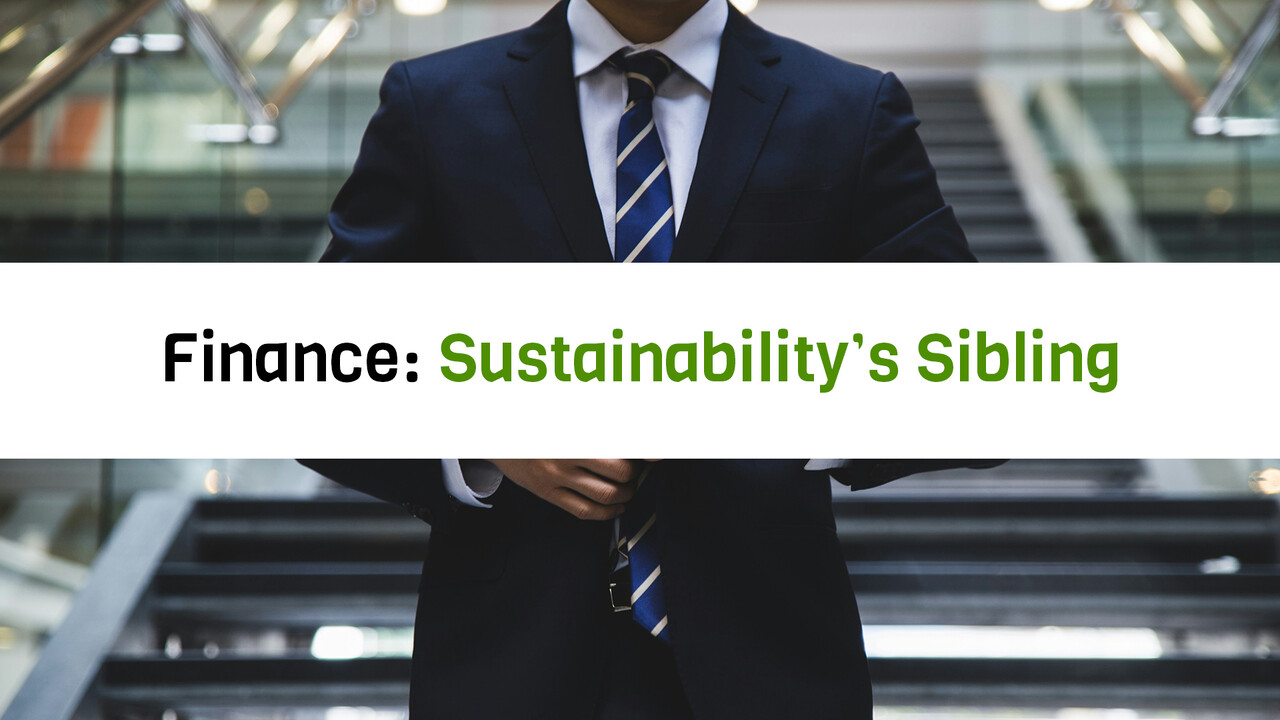5 minutes read: OpEd “Finance: Sustainability’s Sibling” featuring Bel : from CFO to Chief Impact Officer, How Earning Calls Climate Risk disclosure affects companies valuation & PepsiCo using Finance to drive Sustainability + introducing our call to action for participation to our Sustainability Resilience Survey.
A lot is happening around the world these days, especially in terms of extreme weather events with drastic consequences on our economies. In an age where some climate-skeptic still exists (sadly), we couldn’t resists sharing this ironic cartoon by Rohan Chakravarty – aka green_humour on Instagram 😉.

The Green Link Sustainability Strategy Framework series – Part 2
This Catalyst’s edition kicks-off the review of the 5 supporting domains of The Green Link ‘s Sustainability Strategy Framework. Starting today with Finance, we will explore in the coming editions HR, Operations, Legal & IT… before looking at the rest of all other business ecosystem actors.
Let’s dive in great inspiring example of leveraging Finance to achieve your company’s sustainability ambitions.
Op-Ed_
With an ever-increasing regulatory pressure, Finance Departments are being more and more involved in Sustainability. Which is good news, but not enough.
Sadly, in our experience since 2019, we have found out that too often than not, the involvement is solely focused on the disclosure aspects and not on the value creation that can be brought by operationalising & executing a clever sustainability strategy.
In The Green Link‘s philosophy, Finance is a key supporting business partner for a Sustainability Team. An enabler, a catalyst and an ally in driving the conversation towards value creation (vs costs of sustainability initiatives).
Let’s look at great examples where this has come true.
Bel : From CFO to Chief Impact Officer
The iconic red Baby-Bel cheesemaker Belhas chosen to merge Finance and Sustainability under a single leader: the group’s Chief Impact Officer.
This bold moved led Frederic Medard , Bel‘s Chief Impact Officer to be the recipient of the 2023 DFCG Responsible CFO Award in France.

As Frédéric explains in this video interviews, key reasons to merge these functions included:
- The capacity to boost the operationalisation of the Sustainability ambitions.
- Ensuring that any investment will be investigated with both a financial and an environmental lens.
- Implementing Sustainability as a core component of employees’ financial incentives schemes
From our own experience at The Green Link, working for and sharing knowledge with Bel‘s sustainability team these past few years, we have seen the powerful effect this move brought.
Especially when it comes to removing roadblock or speeding up response time.
No operational department will risk finding itself on the “black list” of the Finance Department due to a lack of cooperation – especially as they want to secure next year’s budget 😎.
You can access Frédéric Médard‘s interview recording (in French) here.
Ignoring climate change risks decreases your Company value
A very interesting analysis has recently been performed on the topic of climate risk management and companies perceived total worth by financial institution. This study was conducted by the Hong Kong Institute for Monetary and Financial Research (HKIMR) and driven by Qing Li (University of Florida), Hongyu Shan (China Europe International Business School (CEIBS) and Fordham University), Yuehua Tang (University of Florida) and Vincent Yao(Georgia State University).
What’s really interesting in the approach taken by the study team is examining transcripts for information shared during the quarterly earning calls of 4,719 U.S. firms between 2002 and 2018.
The team stayed away from benchmarking any ESG-based disclosures reports and focused on the language & choice of words used by CFOs during the call as well as the market reaction (i.e., the stock price evolution after the calls).
By investing how climate risks are spoken about and addressed with an action plan (or not) by the companies during the call, the team found that financials markets appear to discount only firms that do not actively manage their transition risk, while not penalizing those that address risk proactively.
This means that having Financeactively supporting the Sustainability Strategy is one of the best way to secure access to capital markets and source of fundings.
As climate change becomes more & more relevant for investors, it’s in a company’s Finance Department best interest to join forces with Sustainability Teams.
You can explore more detailed findings in this great article by Sarah DeWeerdt in the Anthropocene Magazine – the original study can be found here.
PepsiCo uses Finance to drive sustainability execution
Any company that produces and sell physical products must be climate-ambitious. This means that when decision time comes for any change in how a product is manufactured, environmental metrics must be brought into the conversation in order to avoid the 20th century “bottom-line myopia”.
As quoted by Jim Andrew , PepsiCo‘s Chief Sustainability Officer, “PepsiCo Positive (the company’s sustainability strategy) is not a sustainability program. PepsiCo Positive is a company transformation program.”
First, PepsiCo has fully embraced this approach and now, physical metric such as water consumption or recycled material purchases, eco-friendly packaging end-of-life impact fully part of the information “cockpit” used internally to make decisions.
Second, instead of sticking to a yearly disclosure report on the environmental footprint of the company and its products. PepsiCo tracks and monitors progress every quarter just like any regular strategy execution review process.
“We can ask, when we roll it up, whether we are where we need to be in 2024, 2025, and then we can ask, ‘What are we doing to do about it?’ while we are still in-process, as opposed to getting to the end of the year and saying, ‘Oh, we didn’t hit our goals, too bad.’”
By ensuring Sustainability Progress Review is performed every quarter alongside Financial & Operation Progress Review, Sustainability professionals have the opportunity to move beyond just publishing an autopsy report and actually start driving the strategy 😎
More details on PepsiCo approach in this article by Heather Clancy from Trellis Group .
Call to Action : 🔊 #Sustainability Professionals. We need you!
🔎 We’re carrying out some important open research into the roles, outlook and wellbeing of professionals in the sustainability space.
🎓 This is an independent non-commercial, seminal piece of professional and academic research trying to understand the strains on sustainability professionals and ultimately, understand how and where the industry needs to support professionals to do what they do before they burn out.
We need 100 more respondents for this important assessment of the industry before May 15th.
Please help us fill in this quick survey and help us shape Sustainability for the better. Your thoughts and insights will inform key industry initiatives.
https://lnkd.in/eEQNd-s2 | Code: 886 5589
The survey is anonymous and the results will be published openly on LinkedIn and key academic journals.
We will give respondents advance copies and summaries of the findings as well as roundtable invites to discuss the findings this summer in person in London, and online globally.
We thank you for your help in advance.



